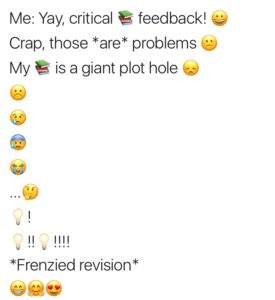This post is about critical feedback. Not the feedback that makes you feel great about your book, or your talent, but the feedback that feels like a punch to the gut. Because you can’t ignore it or dismiss it. Because when you read it, you think, “Oh noooooooooooo!!!!!” as lightbulbs explode (metaphorically) above your head.
Personally, I wish every new writer a few rounds of mostly positive feedback in the beginning. Some ego stroking, some friendly “atta girl!” but once you’ve made it past the early stages, my wish for every writer is to get some gut-punch feedback. I’m not talking about straight-up, negative, “you suck and should give up” feedback. That’s face slapping, not gut punching, and I don’t support that at all. Not helpful.
No, I’m talking about feedback that points out a weak point in your story that you didn’t see before, but that, when you hear it, you realize is completely right. There is, indeed, a problem. A problem that can’t be easily fixed with a few quick edits. If it’s an important part of the story, this means you may have a LOT of work to do. And that’s scary. But what’s worse is sending the story out into the world not realizing it has a huge literary pimple on its nose.
I’m just twirling around the room throwing metaphors everywhere today, folks!
Back to the point. I was lucky enough to get gut-punch feedback a few weeks ago. I entered another mentor/mentee competition and while I didn’t get chosen, one of the mentors generously sent feedback to everyone she didn’t choose, including me.
She had read my query letter and my first ten pages, and based on what she read, she made assumptions about where the story was heading and what message the story was trying to tell (like every reader does.) And her assumptions were…. well, almost the complete opposite of what I was trying to say. I realize that’s vague and confusing, but bear with me. Speculative fiction is often about themes and underlying messages about our real society. She thought she saw hints of what I was trying to say, and it didn’t sit right with her.
Now, keep in mind this is ten pages. Ten. And the first ten pages have a LOT of jobs to do- introduce the main character and make the reader care what happens to them, set the scene, hint at the major conflict, allude to the themes of the book, catch the reader’s interest, and (for non-contemporary books) introduce the reader to a world they are unfamiliar with. Just a few pages have a LOT of work to do. My book tackles some complex themes in a novel way (in my opinion) and it isn’t easy to make that crystal clear in a few pages while doing all the rest I mentioned above. She liked the writing, she liked the character, but she was irritated with what she thought the story was going to say about the world we live in.
I sent her back a note, thanking her sincerely for taking the time to send feedback. I wanted her to know that she had done me a huge favor. I explained what I was trying to do with this story, and thanked her again for bringing the problem to my attention. I wasn’t sure if I’d ever hear from her again, but I was ready to do some major brainstorming and problem solving. After all, if she read it that way, some or many agents would, too.
She responded with a long email full of “Oh yay!” and lots of exclamation points. She sounded thrilled to hear that I had given the book’s themes a lot of thought and was trying to make a purposeful argument. And, as she put it, she hadn’t interpreted it the way I intended, but it was nothing that revision couldn’t fix.
I felt SO relieved. I still wasn’t sure exactly how to fix the problem, but I had redeemed myself, and the rest was fixable, at least theoretically. She gave a bunch of suggestions, complete with video clips and passages from books, and honestly, it was like getting an MFA in creative writing uploaded directly to my brain at super-speed.
I might still be nursing a knowledge hangover.
In conclusion, my week in emoji:

So. I thought I was nearing the finish line, but instead I’m looking at completely re-writing the beginning chapters (at the very least) and that’s daunting, but I’m trying to have faith. This isn’t the first time I’ve stared into the creative void, and in the past, I’ve always figured it out. This process is not new. First, panic. Then sulk. Next, brainstorm. Finally, fix.
The good thing is, I know the book will be much better once I’ve finished this round of revisions. So, wish me luck!
You got this!